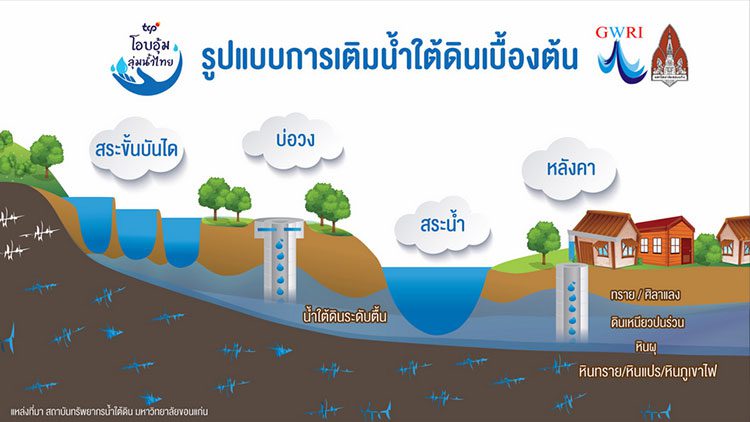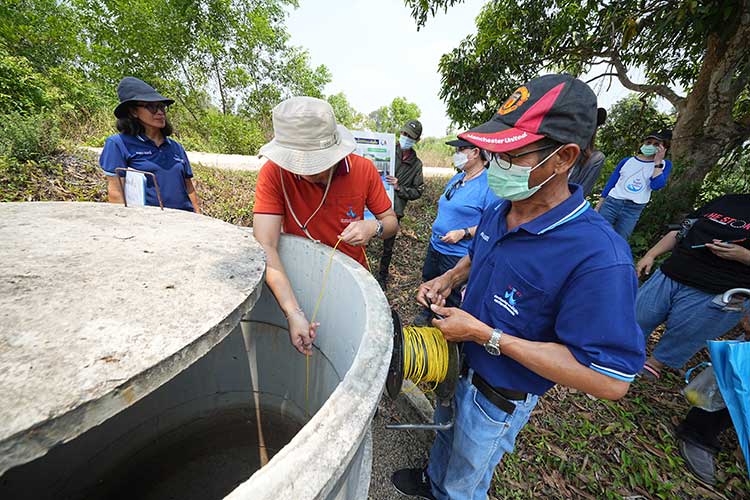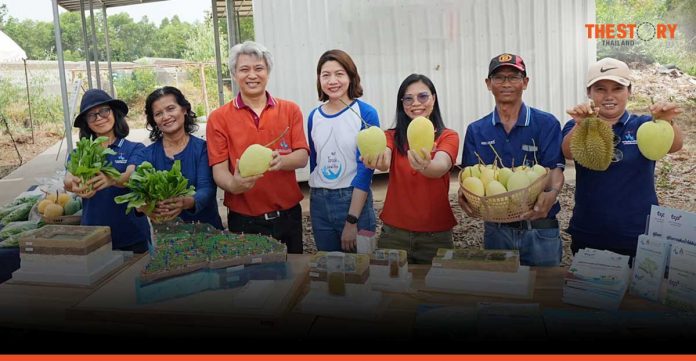Kicks-off the “Managed Aquifer Recharge” community model in Nontree Sub-district, Prachin Buri Province
Managed Aquifer Recharge (MAR) is an additional dimension of sustainable water management that has been accepted and successfully implemented in many countries. In Thailand, TCP Group has collaborated with the Groundwater Resources Institute at Khon Kaen University to establish a sustainable water development and management project by replenishing shallow groundwater. The project was piloted at Nontree Sub-district, Prachin Buri Province, covering an area of over 42,000 rai. This initiative has created a community model in which the villagers have participated and gained a strong knowledge of groundwater. This understanding has resulted in benefits in their own space and has been extended into an economic model that generates income for the community.
TCP Group initiated the “TCP Embracing Thailand’s River Basin” project, with a mission to improve water resource management in all dimensions, including surface water and groundwater, creating sustainability and positive impacts for society. The ultimate objective is for the organization to become Net Water Positive by reducing consumption from water resources and returning more than 100% clean water to local water sources.
Guidelines for Managed Aquifer Recharge (MAR): “Study-Explore-Construct”
Asst. Prof. Phayom Sarapirom, Ph.D., Director of the Groundwater Resources Institute at Khon Kaen University, talked about the MAR project in the Bang Pakong river basin and said, “MAR is one of the effective solutions to drought problems, which has become popular worldwide such as the United States, England, Australia, Israel, China, and South Korea. Due to the effects of global warming, the current global drought is not seasonal but will occur over many years. During high-water years, water must be accumulated for use in low-water years.
Therefore, relying solely on surface water storage is insufficient to ensure long-term water security. MAR can be applied in various ways depending on the suitability of conditions in each area. Our project began in 2018, and the first two years were spent studying and exploring the hydrogeology, soil layers, rock layers, and the quantity and quality of both surface water and groundwater to determine suitability. Nontree Sub-district was selected as a community model due to its potential suitability for groundwater replenishment and for being an organic farming area. Furthermore, the community has a strong network that is ready to build and serve as a model for others passing on valuable knowledge.”
In Nontree Sub-district, Prachin Buri Province, the primary water problem is drought, despite the heavy rainfall and flooding that occurs almost every year. Surface water sources can evaporate resulting in shortages. As a result, collecting water in underground reservoirs for use during the dry season is one of the methods used to effectively help manage the water supply.

The four approaches to applying MAR in the area of Nontree Sub-district, Prachin Buri Province are:
- Percolation tank, which is suitable for areas with high slopes and abundant water, as they can store and quickly replenish large amounts.
- Recharge basin, which is suitable for areas where abundant water flows through and is collected, as it can retain a large amount.
- Dry well, which is suitable for a small area with a steep slope, ditch, or a clear way for the water to flow.
- Rooftop harvesting is suitable for community areas or households with limited space. The added water is clean, so it can be used in households.
Increasing the primary water supply to energize the local economy
“As an organization that utilizes water for its beverage business, TCP Group places great importance on the sustainable development of water resources. Furthermore, we ensure that the community has sufficient water sources for consumption and agriculture, which in turn, improves their quality of life and economy, generating more income for farmers.
This mission was initiated and continued by Saravoot Yoovidhya, Chief Executive Officer of TCP Group. We support water management in all dimensions making it suitable for the different context of each area,” said Arjaree Suwangool, Corporate Affairs & Communications Department Director of TCP Group who added, “We participated in the MAR project in the Bang Pakong river basin area ensuring that all aspects of the project are completed. Government sectors will take care of adding water to public water sources, such as rivers and canals.
The role of TCP Group is to help add shallow groundwater levels in community and agricultural areas for villagers. By working closely with Khon Kaen University, community leaders, and villagers, we can be proud of the project’s achievements. This is not only improving farming but also energizing the economic power of the community, creating opportunities to generate stable and sustainable incomes.
Since community members have started growing high-value crops, such as durian, mangosteen, and marian plum, from 2021 to 2022, their accumulated income from agricultural products has exceeded 1.8 million baht. This has also paved the way for further developing the area into an innovative tourist destination, which is beneficial for the community.”
At present, Nontree Sub-district in Prachin Buri Province has experienced an increase in agricultural productivity of 7.57 million baht per year, with a rise in the number of agricultural activities from 61 to 123. This has resulted in a social return on investment (SROI) of one baht for every 17.09 baht invested.

Phaijit Jomphan, Head Committee of the Community Model Network for Managed Aquifer Recharge, said, “The Nontree community has focused on growing organic crops. In the past, farmers had to choose to grow drought-resistant plants, such as cassava and eucalyptus, due to water shortages. There is an uncertain amount of water available each year, and although we help each other to solve water problems, it remains inadequate. We are working hard, but productivity is unpredictable due to the water problems that occur annually, which makes us want to give up.
When a project to replenish groundwater is implemented, it provides us with knowledge. We can work together to develop and manage water resources, and stabilize the water supply. Villagers can then invest in growing more economically valuable crops, which can create a strong community model network of ‘Managed Aquifer Recharge’ with an increasing number of households participating. This is because everyone in the community receives mutual benefits from adding groundwater, such as having a sufficient amount of water for consumption – even in the dry season. Additionally, the community is ready to transfer their knowledge to other communities. So far, more than 800 interested farmers have learned from us.”
Performance of the MAR project in the Nontree Sub-district, Prachin Buri Province from 2020 to 2022:
- The MAR system was established at 49 systems, resulting in more than 5.4 million cubic meters of water being filled.
- The project has provided direct and indirect benefits to areas covering more than 31,000 rai, which is equivalent to 74 percent of the sub-district area of over 42,000 rai.
- The project’s benefits are valued at 34.17 million baht.
- The social return on investment (SROI) is one baht for every 17.09 baht invested.
In this regard, through the “TCP Embracing Thailand’s River Basin” project, TCP Group has provided 100 million baht in funding support aimed at sustainable water development and management by replenishing groundwater in the Bang Pakong river basin area. This funding is in line with the company’s five-year operational plan (2019-2023) in the Bang Pakong river basin, Yom river basin, as well as the Mekong river basin areas, covering seven provinces. This has provided access to more than 15 million cubic meters of water for consumption, which is over three times the amount of water used by TCP Group throughout the process – and supports the group’s “Caring – energizing our environment” strategy.
NESCAFÉ brewing sustainable future for Thailand’s coffee sector through regenerative agriculture





